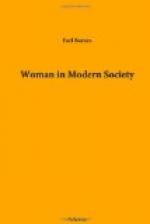If we turn from education to the press we have similar conditions. During these past few years, hundreds of journals have sprung up devoted to women’s special interests. They are almost all of them showy, fragmentary, personal, concrete and emotional. It is difficult to find one that represents general or abstract interests. At least one of these journals which boasts a fabulous circulation is supported by its women subscribers and readers to oppose the larger interests of women in education, industry and political life. At least, if it does not oppose these interests, it does not aid them. Imagine a million German women sending the Kaiser one dollar and a half a year to induce him to tell them once a month to go back to their kitchens, churches and children!
The newspapers of America have steadily changed during the last three decades in the same direction. Editorial pages and news columns have been steadily modified in the direction of fragmentary, egoistic, personal and sensational, or at least emotional, appeals. These are the qualities of children’s minds and of undeveloped minds everywhere. The change is, of course, a part of the larger democratic movement of our time, and many causes have contributed to bring it about. Had women not been so active, something of the same sort would have happened; but if women were all to forget how to read overnight, there is little doubt that the newspapers would find it advantageous to print more statesmanlike editorials and more general and abstract news.
With the weeklies and monthlies, the change taking place is the same. The new reading public, brought in by increase in population and by popular education, does not support the Atlantic, the Century and Scribner’s, but turns to Munsey’s, McClure’s and Everybody’s. The very change in names speaks of the new personal and egoistic element that has come into journalism. Of course, such changes are only in part due to the influence of women, but the change is in the direction of the qualities that characterize distinctively women’s journals.
In books, the personal and romantic novel has taken precedence over every other form of literature. Many of these are written by women; their circulation, both through libraries and through sales, is much greater with women than with men; and in many of them the personal gossip is as transient as that which fills the evening papers.[31]
[31] The Feminine Note in Fiction, by W.L. COURTNEY, London, Chapman & Hall, 1904; the author tries to prove that there is such a thing as a feminine style in fiction.
In the churches, especially in the ritualistic churches, women have long been the faithful attendants. Nowhere, except in the churches which make a rationalistic and abstract appeal, and in the Ethical Societies, does one find a preponderance of men. In 1903, a careful enumeration of all attendants at places of worship was made in the city of London. The count was taken on fair Sundays in autumn, and covered both morning and evening services. Sixty-one per cent. of all adult attendants were women, 146,372 more women than men passing through the doors.




